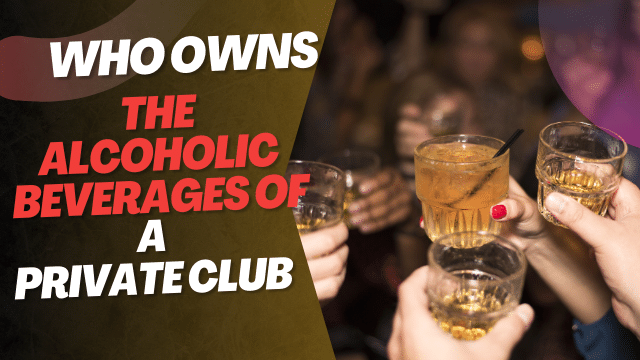The ownership structure of alcoholic beverages within a private club aligns intricately with the club’s governing policies and local regulations. Private clubs typically enjoy autonomy in managing their alcohol inventory, either as a corporate entity or through contributions from individual members. Ownership arrangements vary, with some clubs adopting a membership-driven model where members collectively contribute to the selection of beverages. Local laws and licensing regulations play a pivotal role in influencing a club’s ability to procure, sell, or distribute alcoholic beverages. It’s common for private clubs to have dedicated committees overseeing beverage procurement, ensuring alignment with the club’s mission and member preferences. Understanding the intricacies of alcohol ownership within private clubs requires exploring both internal club policies and the external legal framework.
What is a Private Club?
A private club is a distinct social institution offering exclusive access to recreational, social, and dining facilities for its members. Unlike public establishments, private clubs operate under a membership model, requiring individuals to join for the privileges they offer. Clubs vary widely, including country clubs, golf clubs, yacht clubs, and city clubs. Characterized by exclusivity, private clubs foster a communal atmosphere where like-minded individuals gather for shared interests. Club facilities may include fitness centers, dining rooms, lounges, and recreational spaces. The membership model ensures clubs maintain privacy and tailor offerings to member preferences.
Private clubs establish unique rules, governance structures, and membership fees, creating a distinctive community environment. While specifics vary, the common thread among private clubs is the creation of a members-only space enhancing social connections and providing amenities aligned with the club’s mission.
Who Owns Alcoholic Drinks in a Private Club?
The ownership dynamics of alcoholic beverages within a private club hinge on the club’s structure and governance policies. Ownership may be collective, with the club as an entity. Clubs may operate on a membership-driven model where members contribute to the alcoholic beverage inventory. Committees or individuals may oversee alcohol-related aspects, ensuring compliance with local regulations. Understanding ownership necessitates a closer look at internal policies, membership agreements, and legal constraints.
Does a Private Club Need a Liquor License?
The necessity of a liquor license for a private club depends on jurisdiction regulations and club activities. In many regions, private clubs must obtain a liquor license to legally serve alcoholic beverages. The process involves submitting an application detailing the club’s structure, intended alcohol-related activities, and safety measures. Some jurisdictions offer exemptions or alternative licensing for limited alcohol service. Understanding local laws and obtaining licenses is crucial for responsible operation.
Can I Sell Alcohol to a Club Member?
Selling alcohol to a club member depends on local regulations and the club’s policies. Private clubs, with certain privileges, can sell alcoholic beverages to members with a valid liquor license. Members typically pay fees entitling them to benefits, including alcohol purchases. Understanding rules governing alcohol sales within the club and internal policies ensures responsible practices.
When an Individual Orders a Drink in a Private Club?
Ordering a drink in a private club offers a unique blend of exclusivity and personalized service. Operating within a membership framework, private clubs provide a streamlined, efficient experience. Members have access to a curated selection of beverages, enhancing the enjoyment of the ordered drink. The ambiance adds to the experience, creating a social ritual fostering connections in a members-only space.
Which of the Following Statements About a Private Club Guests is Correct?
The accuracy of statements about guests depends on club policies. Private clubs, operating under a membership model, may allow guests with outlined rules. Some clubs extend guest privileges, specifying visitation details. It’s crucial for members and guests to understand specific guidelines for compliance.
Who is Considered a Minor Under the Texas Alcoholic Beverage Code?
In accordance with the Texas Alcoholic Beverage Code, an individual is considered a minor if under 21. The legal age for alcohol-related activities in Texas is 21, strictly prohibiting sale or provision to minors. Adhering to regulations is crucial for legal compliance and promoting responsible drinking practices.


